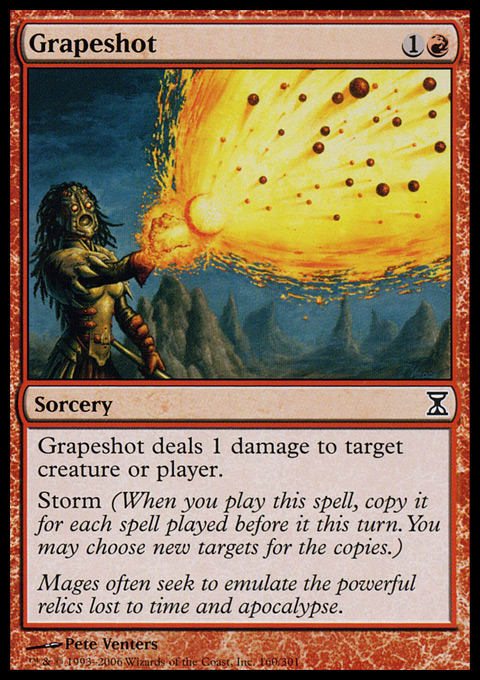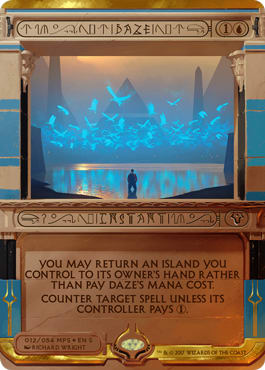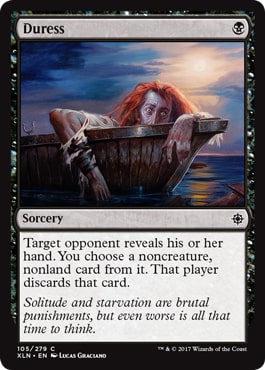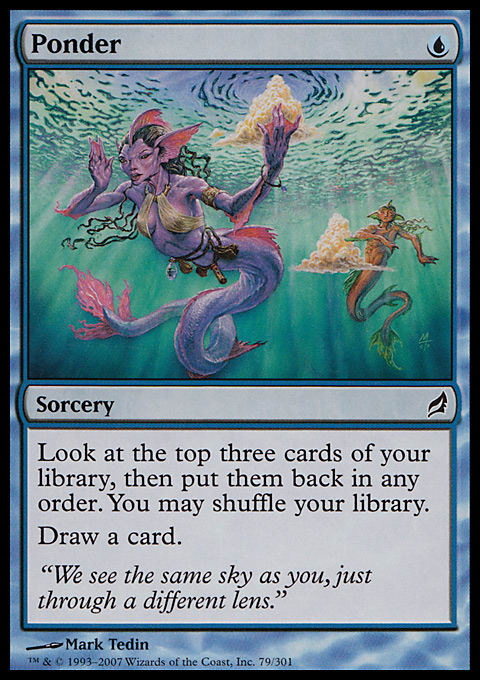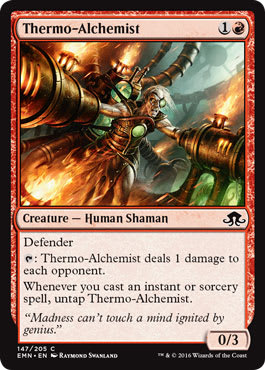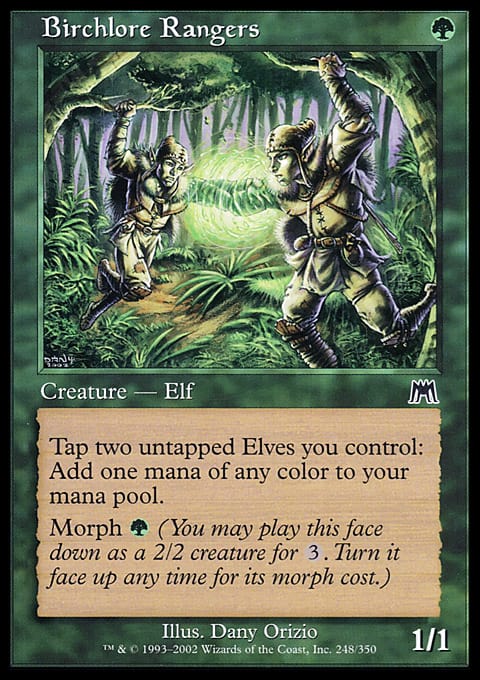When you pull aside hardcore Pauper players and ask about the format as it relates to the Magic at large a trend will arise. Players will expound about the strengths of aggressive decks and wax poetic about Counterspell based control. If they’re allowed to continue to soliloquy a frown will cross their face when it comes to combo. Despite having a robust metagame and a variety of decks combo decks have a fraught history in Pauper.
It is not that they have not existed; it is that they have been dominant to the point of needing to be banned.
A trip down the banned list casts some light on this truth. Grapeshot, Empty the Warrens, and Temporal Fissure are all banned. The first two ended the game on their own while Fissure simply acted as a one sided Obliterate. Cloud of Faeries and Peregrine Drake combined with Ghostly Flicker and Mnemonic Wall (or Archaeomancer) to generate an unbound amount of mana. Frantic Search not only netted mana but also allowed combo decks to filter away dead cards.
Despite the relative of the creatures in Pauper the spells lend themselves to combo decks. There are an abundance of cheap card selection spells and rituals. Ponder and Preordain make it easy for key spells to be found while Rite of Flame and Dark Ritual act as a gushing pipeline. This alone does not make combo too strong. Instead it is the lack of answers that help to make combo decks a dominant force when they are present.
Think about other formats with combo decks. What tools exist to constrain them? The gold standard is Force of Will. The pitch counter cannot stop combo decks on its own but is rather a tool in the arsenal along side cards like Flusterstorm. Wasteland, Strip Mine, and Blood Moon can both constrain mana while cards like Leyline of Sanctity can put a serious constraint on what a combo spout can accomplish. There’s an entire suite of “tax” cards like Lodestone Golem, Chalice of the Void, Thalia, Guardian of Thraben, and so many more. Heck, even Sensei's Divining Top and Counterbalance can work together to keep spells from resolving.
Now this is a gross over simplification of the problem. A card like Empty the Warrens has a number of natural foils in the format — Electrickery, Holy Light, Sandstorm, Echoing Decay, Echoing Truth — but that turns Pauper into a game of “have it or no?”. Pauper has a paucity of preventative measures that force a traditional combo deck to delay their plan and instead has an abundance of reactive cards. Duress is a very strong card but it can only take one piece unlike, say, Cabal Therapy. Similarly there might be excellent countermagic but Counterspell is no Force of Will when it comes to combating engines.
The result of this confluence is that when combo decks are good in Pauper they tend to be absolutely dominant. This truism is not likely to change any time soon thanks to the nature of spells needed to fight combo. Commons, by their nature, have to have fairly standardized effects in that they need to operate along the normal axis of Magic to fulfill their greater function in the game. Combo decks seek to exploit loopholes in how the game runs and the byproduct of this is that many of the best answers to these side games fall at higher rarities.
But combo decks do exist in Pauper. While they may not resemble those stack happy builds of other Eternal formats they can exert a similar pressure on the game. Today I will be looking at some of the more successful combo decks and also some of the more fringe strategies that have a strong following.
Our discussion of aggro closed with Affinity, a deck with access to a combo kill in Atog and Fling. Some Affinity builds have opted for a copy of Temur Battle Rage to attack from a different angle. The first deck in our combo discussion also enjoys getting angry.
Izzet Blitz ? Pauper | Xto2, 5-0 Pauper League
- Creatures (12)
- 4 Delver of Secrets
- 4 Kiln Fiend
- 4 Nivix Cyclops
- Instants (18)
- 1 Brainstorm
- 1 Dispel
- 1 Shadow Rift
- 2 Mutagenic Growth
- 3 Apostle's Blessing
- 3 Gush
- 3 Temur Battle Rage
- 4 Lightning Bolt
- Sorceries (12)
- 4 Gitaxian Probe
- 4 Ponder
- 4 Preordain
- Lands (18)
- 3 Mountain
- 8 Island
- 2 Great Furnace
- 2 Swiftwater Cliffs
- 3 Evolving Wilds
- Sideboard (15)
- 1 Flaring Pain
- 2 Electrickery
- 3 Gorilla Shaman
- 3 Hydroblast
- 3 Outwit
- 3 Pyroblast
Izzet Blitz makes use of many of the same Blue filtering spells that made Storm combo so consistent. While Ponder and Preordain did a fine job of making two goblins or fueling a point of damage for Grapeshot they have a free Lava Spike attached in Izzet Blitz.
The deck is simple in its game plan but deceptively complex in play. The goal is to one shot the opponent with a Kiln Fiend or Nivix Cyclops. Simple, right? To accomplish this the deck runs an abundance of cheap instants and sorceries that also help churn through the deck. Cards like Apostle's Blessing pull double duty in both protecting a threat from removal while also giving a game ending threat a form of evasion. Some builds have opted to run Dispel in the maindeck but it is far more common in the sideboard. Izzet Blitz decks also run Delver of Secrets as a way to reduce the need for a true 20 point swing and Lightning Bolt to clear the path or deal those final few points.
Perhaps the strongest card in the deck is Gush. A combo turn will often start with two Islands in play which will then be tapped for mana before being returned for the alternate casting cost on Gush. A land is then replayed which can give Izzet Blitz access to at least three potential spells before going for a Temur Battle Rage. That is often more than enough to deal the final points of damage. Gitaxian Probe is ideal here as it is a “free” card that deals extra damage on the combo turn. Shadow Rift and Distortion Strike also help punch through for damage while Shadow Rift has additional utility in being able to turn off a lone blocker by giving it Shadow.
Izzet Blitz is a potent deck but it does have a significant flaw — it is creature light and vulnerable to Chainer's Edict. To fight this many Izzet Blitz decks will have Stormbound Geist or Eldrazi Skyspawner in the sideboard. Some builds have taken to running Outwit as a way to find the sorcery and other spells that may be pointed at the dome.
Izzet Blitz has been a consistent contender and can pressure the format in ways few other decks can. The only thing the prevents it from being a world beater is that it has natural foils in the format and it can be inconsistent. Unlike Legacy or Vintage Gush can only return and reset Islands that tap for Blue mana, not a Volcanic Island or its true dual friends. Similarly Terramorphic Expanse and Evolving Wilds may be able to get a Basic Land but by entering the battlefield tapped the tempo hit is real.
The next deck in our list does not have the same mana issues. When your mana base is made up of only Mountains it is hard to draw the wrong land.
Burn ? Pauper | Jrickard, 5-0 Pauper League
- Creatures (7)
- 3 Keldon Marauders
- 4 Thermo-Alchemist
- Instants (18)
- 2 Incinerate
- 4 Fireblast
- 4 Lightning Bolt
- 4 Needle Drop
- 4 Searing Blaze
- Sorceries (12)
- 4 Chain Lightning
- 4 Lava Spike
- 4 Rift Bolt
- Enchantments (4)
- 4 Curse of the Pierced Heart
- Lands (19)
- 17 Mountain
- 2 Forgotten Cave
- Sideboard (15)
- 1 Gut Shot
- 1 Molten Rain
- 2 Relic of Progenitus
- 2 Bloodfire Dwarf
- 2 Electrickery
- 3 Flaring Pain
- 4 Smash to Smithereens
Yes, I consider Burn a combo deck. The combo is assembling enough spells to deal 20 damage. In that way it is similar to Storm except that instead of trying to win over one turn you space it out over several. Burn is extremely mana efficient and can easily spend all its mana every turn. The deck is incredibly redundant with several cards mimicking Lightning Bolt. The cards that break the mold are Needle Drop, Thermo-Alchemist, and Curse of the Pierced Heart.
Pauper Burn is a fantastic expression of the Philosophy of Fire. When each spell is valued at a Lightning Bolt (or better) worth of damage Needle Drop looks rather paltry. The extra card is the key. Needle Drop is actually worth about four damage since more often than not it will draw you into another burn spell. Curse of the Pierced Heart, if left unchecked, will often deal enough damage to warrant taking a turn off. These two cards have been in the format for years but Burn remained a deck that was well positioned in certain metagames. Thermo-Alchemist changed all that.
Thermo-Alchemist makes every instant or sorcery in Burn better. An Alchemist on the board means that every spell now deals four damage instead of three. Needle Drop gets significantly better since it is always “on”. Thermo-Alchemist gives Burn an exceptional amount of reach and shores up one of the deck’s long time weak spots — life gain. Before Alchemist Burn was very good at dealing 21 damage. The Khans of Tarkir Gain Lands and other incidental life gain was often good enough to prolong the game against Burn until the other deck could win. Thermo-Alchemist has made it so Burn can easily deal 25 to 28 damage which puts additional pressure on the defensive deck. A draw involving Thermo-Alchemist and Flame Rift or Fireblast can end the game in short order. The Eldritch Moon common has pushed Burn to another level entirely.
Burn plays like a slow combo deck and despite its resilience it can still falter against persistent defense. Pulse of Murasa can be a huge headache and taking out either a Thermo-Alchemist or a Curse of the Pierced Heart can buy a turn or more. Alchemist means that removal is no longer a completely dead draw against Burn. Curse is harder to deal with but can still taken out with the heavily played Hydroblast. Discard and counters also can be a road block for Burn and with an abundance of cheap answers it has proved hard for Burn to become top of the line contender.
While some removal can be strong against Burn, it is a mixed bag against our third heavily played combo deck.
Elves ? Pauper | Yz0, 5-0 Pauper League
- Creatures (41)
- 1 Ulamog's Crusher
- 2 Fyndhorn Elves
- 2 Nettle Sentinel
- 2 Wellwisher
- 3 Elvish Mystic
- 3 Llanowar Elves
- 4 Birchlore Rangers
- 4 Elvish Vanguard
- 4 Lys Alana Huntmaster
- 4 Priest of Titania
- 4 Quirion Ranger
- 4 Sylvan Ranger
- 4 Timberwatch Elf
- Instants (2)
- 1 Evolution Charm
- 1 Wirewood Pride
- Sorceries (8)
- 4 Distant Melody
- 4 Land Grant
- Enchantments (2)
- 2 Spidersilk Armor
- Sideboard (15)
- 3 Scattershot Archer
- 4 Gleeful Sabotage
- 4 Tangle
- 4 Toil to Renown
Pauper Elves combo is nothing like its Legacy or old Extended namesake. There is no Heritage Druid to combine with Nettle Sentinel to generate excess mana and no Glimpse of Nature to draw an ungodly number of cards. There is no Craterhoof Behemoth at the top end. Instead Elves has Birchlore Rangers to combo with Nettle Sentinel to produce any color of mana. Instead of spending a single Green for Glimpse, Pauper Elves can pay 4 mana to cast Distant Melody to draw for each Elf already on the caster’s side of the table. Instead of an Overrun effect Elves runs Lys Alana Huntmaster to go wide or Elvish Vanguard and Timberwatch Elf to go tall. Elves is a creature centered combo deck capable of explosive starts.
Elves wants to accelerate from the developing stages of the game to mana abundance in a minimal number of turns. A single Forest can yield a Elvish Mystic or Quirion Ranger which lets the deck go for broke on turn two. A Priest of Titania can make any early drops into excess mana which can then make it easier to cast Elvish Vanguard or Timberwatch Elf. These cards can help end the game in short order while Wellwisher makes it easier to stay alive. Some Elves decks have taken to running copies of Ulamog's Crusher to help cement a victory.
Elves is susceptible to removal. Unlike Izzet Blitz or Thermo-Alchemist, which can be stalled with a Chainer's Edict, the staple sorcery looks rather bad against a deck that can easily go wide. Cards like Crypt Rats or Evincar's Justice used to be able to wipe out an entire army of elves but Elvish Vanguard has changed this dynamic. Targeted removal was never bad against Elves and is slightly better now but the deck still can overwhelm a poor reactive draw. Elves needs to survive the early turns with its mana to be relevant and hitting early drops with cards like Firebolt and Dead Weight can buy enough time so that subsequent 1-drops will not matter.
These are the most successful Pauper combo decks in the current metagame. While other combo decks exist, only one fringe archetype has the shell to become a contender in the future.
Midnight Gond ? Pauper | JackMitchellBurns, 5-0 Pauper League
- Creatures (23)
- 3 Selesnya Evangel
- 4 Midnight Guard
- 4 Pallid Mycoderm
- 4 Soul Warden
- 4 Soul's Attendant
- 4 Veteran Armorer
- Instants (9)
- 2 Scatter the Seeds
- 3 Gods Willing
- 4 Sprout Swarm
- Enchantments (7)
- 1 Spidersilk Armor
- 2 Journey to Nowhere
- 4 Presence of Gond
- Lands (21)
- 3 Forest
- 7 Plains
- 3 Selesnya Sanctuary
- 4 Khalni Garden
- 4 Selesnya Guildgate
- Sideboard (15)
- 3 Circle of Protection Red
- 4 Gleeful Sabotage
- 4 Scattershot Archer
- 4 Valeron Outlander
The Pauper version of Splinter Twin puts Presence of Gond on a Midnight Guard to generate an arbitrarily large number of Elf tokens. Combined with the life gain from Soul's Attendant or Soul Warden and the pump ability on Pallid Mycoderm, Midnight Gond has the best ability to “just win” out of any current Pauper deck. The thing holding it back is its inability to find the correct pieces with any sort of consistency. White and Green lack a Ponder caliber card but Vessel of Nascency may be the answer.
The nice thing about Midnight Gond is that outside the core combo the deck is fairly flexible. Midnight Guard and Presence of Gond takes up a scant eight slots and can fit into any existing Selesnya build. As cards continue to see print it is more likely that the deck gets tools needed than not.
Combo exists in a nebulous space in Pauper. Largely creature based it wants to color outside the lines but has to operate within the well defined parameters. Presently combo is strong enough to be a factor without forcing out other strategies. The decks could stand some added juice but too much and something will likely be headed to the banned list.
Next week we wrap up the Pauper Primer with fringe decks and format issues.














